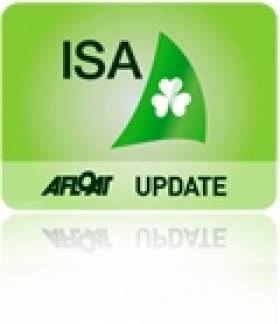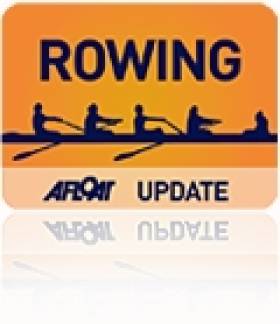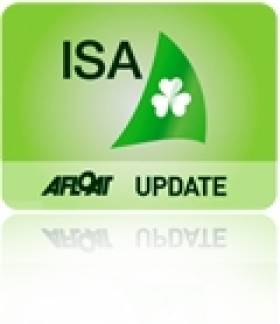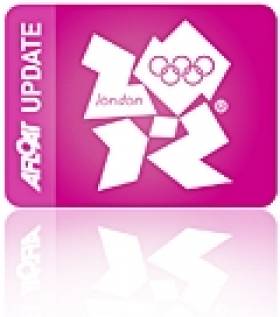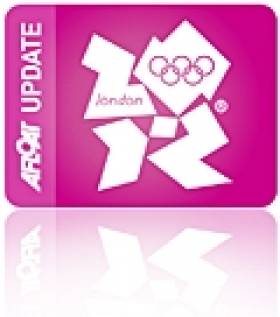Displaying items by tag: Irish Sports Council
Is Being an Olympic Sport Good for Irish Sailing?
#olympicsailing – Water Rat's article: Is ISAF Alive To Sailing's Survival As An Olympic Sport? has raised the issue about the future viability of the Olympic sailing movement and brought reaction from readers, including Midshipman, who says it begs two interesting questions:
· Is being an Olympic sport good for sailing?
· Why have the amazing advances we have witnessed in technology over the last 15 years not made sailing more accessible and less expensive?
With the exception of the Laser (a manufacturer controlled boat which is not cheap at €7,250), none of the boats used in the Olympics are to be found in mainstream sailing.
The explosion in sailing during the 60's and 70's was fuelled by the development of exciting low cost boats built, mainly by amateurs, in plywood using new adhesive and coating techniques.
The turn of the century has seen vast improvements in the technologies used in boat building, making boats lighter, faster, stronger safer, but certainly not cheaper, as amateur construction can no longer compete with the sophisticated techniques of the boating industry.
That is probably why the most popular dinghy class in the world remains the inexpensive and simple Sunfish while low tech Hobie Beach Cats still dominate the multihull scene.
In years gone by, most young sailors got their start in wooden Optimists, often built by enthusiastic parents at modest cost over a couple of weekends and then typically graduated to a home built Mirror or its equivalent for their first experience of multi crewed sailing with multiple sails.
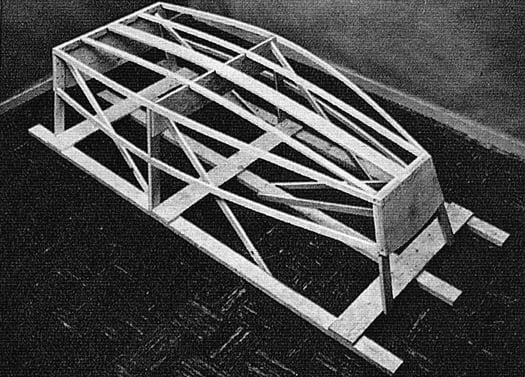
A wooden framework of the early Optimist dinghy
Nothing less than a relatively expensive Glass Fibre Optimist will do now and the Street Cred of young people is dependent on graduating to costly Lasers and 420s. In Ireland this situation is also compounded by the sense of failure youngsters experience if they fail to qualify for one of the Academy or Elite development squads which currently involves over 100 youth sailors of varied abilities.
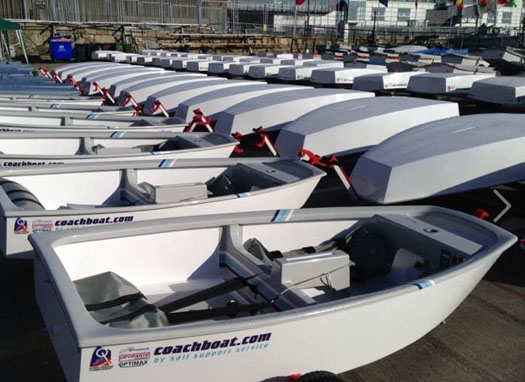
The scene today – charter boats used at Dun Laoghaire for the 2014 Optimist Europeans
Sailing has become so fixated on exciting performance and elite achievement that it has lost sight of the sheer enjoyment of messing about in boats at modest cost which is the principle attraction to the vast majority of people.
We all admire the highly skilled and motivated sailors who aspire to the ultimate Olympic challenge, but let's face it , what they do has virtually no relevance to the activities of most recreational sailors. ISAF uses racing formats and boats which are not reflective of the sport in general, largely on the grounds of needing to excite TV viewers.
With the exception of horse riding, sailing is probably the most equipment dependent (meaning most expensive) sport in the Olympics. I am not sure that this is a message which ultimately helps encourage people to become involved in sailing.
If we want to use the Olympics as a marketing opportunity for sailing, we should use inexpensive boats which are used on a widespread basis by regular sailors and only have 2 events each for men and women whilst eliminating the cost of shipping boats by supplying evenly matched equipment.
Olympic sailing has created a very costly industry which contributes little back to mainstream sailing. The costs are truly horrendous as demonstrated by the recent announcement that the ISA is appointing an additional CEO to head up a funding programme to raise a further €2.75m a year over and above the €1m plus it receives from the Irish Sports Council for Irish Elite sailing activities.
Does the Irish sailing community believe an annual level of expenditure of €3.75m on elite sailing provides the best economic payback to the sport in Ireland? If we could replicate what has been done in New Zealand, maybe there is a business case which can be justified.
However, €15m seems an outrageous amount of money to propose spending over an Olympic cycle, which is equal to something in excess of €800 on behalf of each member of the ISA.
Let's make sailing accessible, less expensive and more engaging and use the Olympics as a shop window to remove the elitist and esoteric imagery created by the current profile of existing Olympic classes.
What we are doing at the moment is deluding ourselves into believing that presenting our sport like NASCAR or Formula 1 motor racing will attract new people to buy Ford Mondeos and Fiat Pandas. – Midshipman
Sports Council Calls for Submissions from Adventure Activity Providers on Safety & Standards
#sailingclubs – Feedback is required by Government 'on the safe and sustainable commercial provision of higher risk adventure activities' including sailing. In an initiative that will be of interest to Irish sailing clubs, sailing centres and instructors, the Irish Sports Council is inviting adventure activities providers to give their feedback on safety and standards in the adventure activities sector, and the development of a register of adventure activity providers.
According to the Sports Council the consultation process provides an opportunity for the adventure activities sector to consider and comment on the means by which current good practice in the sector might be consistently achieved, to support the safe and sustainable commercial provision of higher risk adventure activities.
John Treacy CEO, Irish Sports Council "I invite providers of adventure activities to attend one of the consultation meetings to discuss safeguarding, strengthening and promoting good safety practice within the adventure sector, or to make a written submission to the Council. This information will greatly assist the Council in developing a sensible and proportionate framework to address safety and standards. "
The consultation process includes a series of six meetings with adventure activity providers, as well as the opportunity for written submissions. They will be of interest primarily to commercial adventure activity providers but also to adventure activity instructors. The meetings will take place in Dublin, Galway, Sligo, Monaghan, Macroom and Carlow and will provide an opportunity for collaboration and feedback on shaping future safety standards within the sector.
Michael Ring T.D., Minister of State for Sport and Tourism "Last year, I asked the Irish Sports Council to examine the issues associated with safety and standards in the adventure activities sector, and the development of a register of adventure activity providers. Stakeholder consultation is an integral part of the process which will enable the Council to consider a wide range of views and take account of them in whatever proposals emerge"
The Irish Sports council also welcome written submissions about how current good practice in the safe commercial provision of higher risk adventure activities might be supported through legislation. Submissions can be sent up until 9th May to: Email: [email protected]
Post: Adventure Consultation, Irish Sports Council, Top Floor, Block A, Westend Office Park, Blanchardstown, Dublin 15
High Five for Rowers as Irish Sports Council Confirms Carding
#ROWING: A relatively good 2013 for Irish international rowing will bring practical benefits this year. Five rowers, three more than last year, will receive funding from The Irish Sports Council under the 2014 International Carding Scheme. Sanita Puspure and Claire Lambe have again hit the mark: Puspure qualifies for €20,000 as a world class category athlete and Lambe receives €12,000 as an international class competitor. The two are joined this year by Paul O’Donovan, Leonora Kennedy and Monika Dukarska, who will also be granted €12,000 as international class athletes.
O’Donovan won a medal at the World Under-23 Championships in 2013, while the women’s double sculls of Dukarska and Kennedy finished 10th at the World Championships. This position would secure Olympic qualification for an Ireland boat if it were reproduced at the World Championships next year.
ISA To Receive Sports Capital Programme Funding in 2012
#ISA FUNDING - The Irish Sailing Association will receive a special allocation of €70,000 through the Sports Capital Programme for 2012, it has been announced.
Deputy Michael Ring, Minister of State at the Departent of Transport, Tourism and Sport, made the declaration in response to a parliamentary question from Terrence Flanagan TD in reference to what grant aid will be awarded to Ireland's larger sporting bodies.
As expected, Gaelic games and soccer will receive the bulk of Government investment in 2012, adding up to a total of more than €5.5 million between them.
Meanwhile, both Badminton Ireland and the Irish Sailing Association (ISA) will receive special allocations of €40,000 and €70,000 respectively under the deparment's Sports Capital Programme (SCP).
This award is in addition to the funding received by the ISA via the Irish Sports Council, of which the core grant funding in 2012 totalled €447,313 - with additional grants of €600,000 in high performance funding; €220,000 in direct athlete investment funding; and €21,000 in 'women in sport' funding.
No other allocations under the SCP have been made to national governing bodies in 2012 thus far.
'Podium Athletes' Face Funding Cuts in 2013
#OLYMPICS - Yesterday Ireland's Olympic hopefuls celebrated recognition of their success in the 2012 round of funding.
But cuts to the budget of the Irish Sports Council (ISC) have prompted a "major" review of high performance programmes from 2013 onwards, the Irish Independent reports.
Finbarr Kirwan, director of high performance at the ISC, said: "Changes are coming, things are tight and we will have to make strategic cuts in the next two years."
The result could be fewer grant awards of lesser value for athletes, as Olympic qualification standards are set to get tougher from here on out.
The two tiers below 'podium class' - in which individuals receive awards of €20,000 and €12,000 respectively - are expected to be hardest hit in the review.
As previously reported on Afloat.ie, canoeing's Eoin Rheinisch, swimmer Grainne Murphy and sailors Annalise Murphy, Peter O'Leary and David Burrows each received the top level of funding of €40,000 each, which is on a par with last year's support.
The Irish Independent has more on the story HERE.
Irish Olympic Stars in Action in Weymouth
The clearest indication of Irish sailing form for the 2012 Olympics will be known this week when four Sports council carded sailors go into action in a massive regatta of 800 sailors at the Skandia Sail for Gold Regatta in Weymouth. Annalise Murphy is in the Laser Radial and in the Star class Max Treacy and Anthony Shanks go head to head with Peter O'Leary who the Irish Times says this morning has had a last mniute crew change. David Burrows is out and Germany's Frithjof Kleen is sailing as a late substitution.
If you took a wander around the fine old English seaside resort of Weymouth, you'd find a mix of motives for being there on this particular Sunday in August – the beach, the sea, the ice cream. Move round the bay a little to the Weymouth and Portland National Sailing Academy, where the elite of Olympic sailing are gathered for Skandia Sail for Gold 2010, and you'd think that the replies would be a little more focused – winning, perhaps? But you'd be wrong...
It might be the final event of this year's ISAF Sailing World Cup, not to mention the last but one Olympic class regatta at the 2012 venue before the main event, but not everyone is necessarily here to win. The Dutch 470 sailors, Lisa Westerhof and Lobke Berkhort have racked up five 470 World Championship titles between them, including the most recent, along with Olympic silver in Beijing for Lobke. But when Lisa was asked if they had a choice between going left on the race course to stay with their competition, and going right to learn more about the venue, she replied, "We might choose the right, but we'll have to see," adding with a laugh, "It's nice to have a good result, we're sportsmen, we like to win."
Lisa and Lobke are out of contention for the ISAF Sailing World Cup, but Emmanuelle Rol and Hélène Defrance are just one point behind their French compatriots overall, Ingrid Petitjean and Nadège Douroux. But Rol reckons they have a weakness in breezier conditions after a poor performance at the World Championships, and is hoping to establish that they have improved after training in the Mistral in Marseille, "For us, the result is important, but also to try to have good races in strong conditions, and of course, learn about the Olympic venue. And so far, we have learned that the weather is not as good as in Marseille." The last said, we're sure, purely in jest...
US Sailing Team AlphaGraphics meteorologist (and former holder of the same position for the Luna Rossa America's Cup team), Doug Charko reckoned that Rol and Defrance will have plenty of opportunity to check their heavy weather progress, "There's a low heading into the area, which will probably arrive for Tuesday. So ten to 15 knots for Monday, building during the day, and then Tuesday with the low passing over Scotland there's quite a wide range in the global models, so although I'm hedging my bets a little, I'd say 15 to 20 and gusting to 25 knots from the south-west, raining and unsettled." Things look a little better for the rest of the week, with moderate south-westerly sea breezes forecast – classic Weymouth conditions.
Another Women's 470 contender who theoretically doesn't need to learn much about the venue is double Olympic Yngling Gold medallist and Weymouth resident Sarah Ayton. After recently returning to sailing following the birth of her first child, Ayton and her crew Saskia Clark is not in contention for the overall ISAF Sailing World Cup. But Sarah nevertheless finds herself with a similar balancing act; "You've got to use the opportunity to learn, you don't get many opportunities with a world class fleet in this venue, so it is important to learn. But obviously, it is important to perform in the Olympic venue, so it is a real balancing act of trying things when you can, but bearing in mind the end results." When asked the left or right-side of the course question, she replied with a smile, "It would be hard not to stay with the competition."
Sarah was up on the stage for a very bling opening ceremony, the new Olympic venue dripping with medals two years early. Many of those present are sailing in the Star class, which has some serious star-wattage. Double Olympic-medallist and current Star World Champions, Iain Percy and Andrew Simpson had come straight from Team origin's win over current America's Cup holders, BMW Oracle, in the 1851 Cup.
For Iain Percy, it was a chance to learn about the venue, reckoning that they had to look at each Olympic venue afresh, in a much more analytical, professional way. But there were other reasons for coming to Weymouth, "Myself and Andrew do a lot of other sailing, and whenever we get back in the Star we always have a really good time, relax and enjoy it, old mates going out for a sail. So whenever we get a bit of a window in the calendar we jump at trying to get out in the Star for a bit of fun, and that's the main reason we're here."
Further Quotes
Lisa Westerhof (Holland, Women's 470, current World Champions), on their priorities for Skandia Sail for Gold; "We do set priorities during the year and our main goal this year was the World Championships. We use the World Cup to work with our processes and to develop equipment. We'll use this week to get to know the conditions in Weymouth and to get a feel for the water and the sailing conditions. But the weather and the systems - the low pressure and high pressure weather systems - the variety in the weather is comparable to Holland, so we feel at home."
Emmanuelle Rol (France, Women's 470, currently second in ISAF Sailing World Cup), on their priorities for Skandia Sail for Gold; "We are using the same equipment here as at the Worlds - developing gear will be the winter's task, we will try some new stuff then. We are quite a new crew together, so we had to work out our team work, and our next job will be to work on the equipment."
Iain Percy (Britain, Star, current World Champion), on the topic of keeping current with Olympic sailing, while balancing it with other sailing commitments; "I tried a little experiment after 2000 with the Finn, when I used to go back and have a race against the guys - and after nine months I felt pretty good, but then when I went back and tried it a couple of years later I was absolutely hopeless. So somewhere between your brain and your hands there's a memory that runs out after a certain amount of time."




























